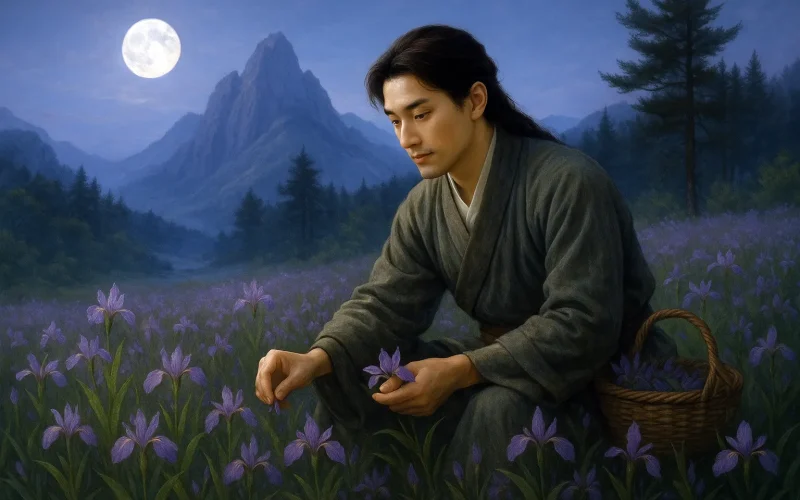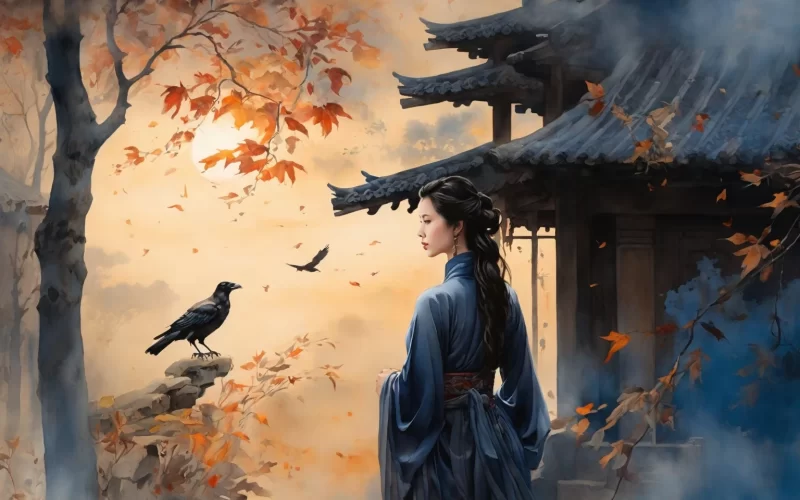I have a long, long-existing cot
‘Neath the Fair Maiden Peak, a lovely spot.
I will keep for you a brilliant moon
Above the pine-clad east creek, hung so high.
You’ll go to cull the herb of immortality
With the grass of sweet flag ‘neath the purple sky.
I’ll visit you there some day, for long
I’ll ride a white dragon in the blue sky.
Original Poem
「送杨山人归嵩山」
李白
我有万古宅,嵩阳玉女峰。
长留一片月,挂在东溪松。
尔去掇仙草,菖蒲花紫茸。
岁晚或相访,青天骑白龙。
Interpretation
Composed during Li Bai's travels through the Liang-Song and Qi-Lu regions, this poem represents a quintessential example of his farewell verses dedicated to reclusive friends. The dedicatee, "Hermit Yang"—a noble scholar dwelling in seclusion on Mount Song (though historical details remain obscure)—embodies Li Bai's idealized conception of the eremitic tradition. As a sacred Daoist site whose Jade Maiden Peak is steeped in legends of immortal inhabitants, Mount Song serves not merely as a geographical backdrop for the parting, but as a symbolic conduit for expressing the poet's yearning for transcendent realms and spiritual liberation.
First Couplet: "我有万古宅,嵩阳玉女峰。"
Wǒ yǒu wàngǔ zhái, Sōng yáng Yùnǚ fēng.
I possess an eternal abode—the Jade Maiden Peak on Mount Song's south side.
The opening declares a transcendent claim. "I possess" signifies not material ownership but spiritual belonging, showcasing the poet's bold communion with cosmic spirit. "Eternal abode" grants the peak timeless quality—it is both geographical reality and the poet's and his friend's shared, immortal spiritual homeland.
Second Couplet: "长留一片月,挂在东溪松。"
Cháng liú yīpiàn yuè, guà zài dōng xī sōng.
I'll make a slice of moonlight linger long, Hung on the pines by Eastern Creek.
This couplet epitomizes Li Bai's romantic imagination. Assuming a master's stance, he "makes moonlight linger,"凝固 flowing time and radiance into an eternal tableau. "Hung" ingeniously materializes intangible moonlight, turning it into a permanent ornament in this celestial dwelling. The moon-pine combination creates a serene, pure, timeless mood—a reclusive vision the poet gifts to both his friend and himself.
Third Couplet: "尔去掇仙草,菖蒲花紫茸。"
Ěr qù duō xiāncǎo, chāngpú huā zǐ róng.
You'll gather immortal herbs there; See the calamus blooms' purple down.
The poet shifts from grand celestial fancy to the friend's specific reclusive life. "Gather immortal herbs" typifies transcendent seclusion with Daoist hues. "Calamus blooms' purple down" adds vibrant color (purple) and unique texture (downy) to the hermit's deep solitude, blessing the friend with longevity and infusing vitality into the scene.
Fourth Couplet: "岁晚或相访,青天骑白龙。"
Suì wǎn huò xiāng fǎng, qīngtiān qí báilóng.
In later years I may visit you, Astride a white dragon through blue skies.
The finale elevates the poem to its climax. Parting holds no sorrow but promises a more poetic reunion. "Later years" implies lingering worldly ties yet ultimate commitment to reclusion. "Astride a white dragon through blue skies" is magnificently novel—transcending mundane travel, it visualizes Daoist ascension and portrays Li Bai's unconstrained soul, turning farewell into a celestial adventure.
Holistic Appreciation
This poem utterly transcends the melancholy tone of traditional farewell verse, brimming with transcendent aura and bold passion. From the "eternal abode" opening to the "astride a white dragon" close, it constructs a complete fantasy sequence from timeless paradise to immortal roaming. Though framed as farewell, the work expounds reclusive ideals. Mount Song, the friend's destination, becomes a projection of Li Bai's spirit, transforming the poem into a hymn to cosmic freedom.
Artistic Merits
- Intensified Subjective Perspective: The consistent "I" viewpoint governs narration, imagination, and promise, radiating strong self-awareness and spiritual agency.
- Fantastical Blend of Real and Unreal: Interweaving actual Mount Song and Jade Maiden Peak with imagined "lingering moonlight" and "dragon-riding" creates a dreamlike, immortal aura.
- Serene and Dynamic Imagery: "Jade Maiden Peak," "Eastern Creek pines," and "purple down" evoke quiet beauty; "astride a white dragon" bursts with motion and power, merging tranquility and soaring energy.
- Emotional Sublimation: Friendship elevates into shared pursuit of ideals (reclusion and transcendence), rendering parting lofty and detached.
Insights
This poem demonstrates an aesthetic, transcendent approach to life's separations and limitations. Li Bai transforms ordinary farewell into construction of a spiritual homeland and celebration of free existence. It reveals true "possession" lies not in physical occupation but in spiritual belonging; true "parting" can be not an end but a journey toward respective ideals, with a promise to reunite at higher realms. In our constraint-filled world, the imagination and boldness to guard an inner "eternal abode" and dare "ride a white dragon through blue skies" remain profoundly valuable.
About the poet

Li Bai (李白), 701 - 762 A.D., whose ancestral home was in Gansu, was preceded by Li Guang, a general of the Han Dynasty. Tang poetry is one of the brightest constellations in the history of Chinese literature, and one of the brightest stars is Li Bai.












